Men's Health has flexed its muscles and ended FHM's 13-year reign as the biggest paid-for title in the men's lifestyle sector.
Men's Health, published by Natmag Rodale, recorded its 15th consecutive year-on-year rise - up 2.1% year on year to an average sale of 250,247, prompting the title's publisher, Alun Williams, to declare: "The era of lads' magazines is over."
This trend is illustrated by the fact that FHM, where circulation has shrunk from 775,000 in 1998 to 235,027 in this set of ABCs, now prefers the moniker "lifestyle title" to "lads' mag".
FHM has tried to tap into the success of Men's Health by reviving its health spin-off FHM Bionic as a twice-yearly offering.
As the paid-for market shrinks, Williams says the key to Men's Health's success is achieving incremental ABC increases and its ability to "build on each success quickly".
The men's market is still led by free weeklies ShortList and Sport, with the former's monitored free distribution more than twice the circulation of Men's Health.
Mike Soutar, chief executive of ShortList Media, says ShortList has proved a viable alternative to upmarket brands such as GQ and Esquire. "If advertisers want to connect with ShortList, we have twice the reach of our nearest competitor," he adds.
ShortList's rival weeklies, Bauer Consumer Media's Zoo and IPC's Nuts, suffered alarming year-on-year falls - 31.2% and 24.6%, respectively.
But Jo Smalley, publishing director at Nuts and Loaded, points to the "key metric" of newstrade and single-copy sales, not inflated by free copies. He highlights the fact that Nuts has 178,515 newstrade and single-copy sales, while Men's Health has 145,815.
Men's Health relies heavily on subscriptions, of which 181 are sold at full rate and 65,331 at a lower rate. It also reported a monitored free distribution of 11,338.
Smalley says Nuts is "immensely profitable" for IPC, which became the first publisher to disclose a monthly breakdown of ABCe audited website figures for some of its brands, in an effort to give advertisers a more complete picture.
IPC's Loaded, for instance, published an average monthly unique user figure of 316,334 for the first six months of 2009. IPC Ignite managing director Eric Fuller says: "These results clearly show the scale of the Ignite digital portfolio."
Eve Samuel-Camps, head of press at Universal McCann, says: "The younger men's weeklies are in freefall, with Nuts and Zoo markedly down. Given the lack of price promotions in the past six months, Nuts' result is slightly better. While the results are dismal, Nuts still circulated 519,101 more copies than FHM each month, showing there is still a market for the men's weeklies."
Other media buyers are worried by the performance of upmarket titles GQ and Esquire, which Alan Brydon, MPG's head of press, describes as "not massive circulation titles". He adds: "People moan about The Independent selling 190,000 copies, but they should see what some of these mags are doing."
Brydon believes the men's titles that have suffered double-digit year-on-year falls will struggle to hold on to their yields next year, indicating that other media, such as outdoor, could benefit.
Men's Health was not alone in boosting its circulation by giving away free copies. FHM gave away 20,000 copies, GQ gave away 9,553 and Esquire registered more than 6,761 free copies.



